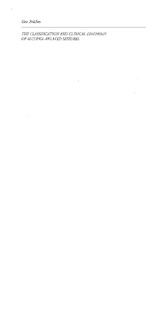The classification and clinical diagnosis of Alcohol-related seizures
Abstract
The aims of this dissertation were to investigate alcohol-related seizures in clinical neurological practice. We wanted to assess the extent of this problem, to classify the seizures, and to investigate methods to improve the clinical diagnosis of such seizures. We propose an arbitrary but simple and reproducible way of diagnosing alcohol-related seizures and alcohol withdrawal seizures. Papers I and II relate to seizure classification and the extent of the problem in relation to the level and weekly pattern of alcohol use. Paper III investigates the performance of various biological markers as aids in the diagnosis of alcohol-related seizures. Paper IV explores pitfalls in the result interpretation for two methods for detection of CDT in patients with neurological disorders. Paper V investigates the utility of standard EEG for the identification of alcohol-related seizures.
Even though the general alcohol consumption in our region is low, every third patient with an epileptic seizure leading to hospitalisation had hazardous alcohol consumption.
Evidence of focal lesions or focal seizure start was found in a high proportion of alcohol-related seizures. All such seizures were secondarily generalized and thus, we challenge the establishment impression that the vast majority of alcohol-related seizures are primarily generalized. Binge drinking (more than six drinks for men or four drinks for women, in a single drinking occasion) was common, but had little influence on seizure susceptibility or timing of seizures. In contrast to prior knowledge, we found that in some patients there was no time lag from cessation of drinking to the occurrence of a seizure, but falling intake levels prior to withdrawal seizures were demonstrated. This indicates that a state of relative withdrawal while still drinking may be sufficient to induce a seizure. Carbohydrate-deficient transferring (CDT) is the most accurate biomarker for alcohol use and good adjunct to the diagnosis of alcohol-related seizures, but its accuracy does not compete with a good clinical investigation. Generally poor accuracy should be expected for fertile women. Women on enzyme-inducing antiepileptic drugs who drink no or little alcohol seem to be at risk of having false positive CDT. Other variables associated with increased CDT were low body mass index, or having total transferring levels outside normal range. A definitely abnormal EEG suggests epilepsy or symptomatic seizures unrelated to alcohol use. The predictive value of a normal EEG is limited, but the typical post-ictal finding in alcohol-related seizures is nevertheless a normal low-amplitude EEG record.
The best method for identification of alcohol-related seizures is a clinical work-up based on a thorough medical history. The Alcohol Use Disorders Identification Test (AUDIT) provides a reliable measure of drinking habits. CDT is a good supplement to the clinical diagnosis when there is doubt, if factors associated with false-positive values are appreciated. The diagnostic value of EEG is limited.
Has parts
Bråthen, G; Brodtkorb, E; Helde, G; Sand, T; Bovim, G. The diversity of seizures related to alcohol use. A study of consecutive patients. European Journal of Neurology. 6(6): 697, 1999.Bråthen, G; Brodtkorb, E; Helde, G; Helde, G; Bovim, G. Weekday distribution of alcohol consumption in Norway: influence on the occurrence of epileptic seizures and stroke?. European Journal of Neurology. 7(4): 413, 2000.
Bråthen, G; Brodtkorb, E; Bovim, G; Bjerve, KS. Validity of carbohydrate deficient transferrin and other markers as diagnostic aids in the detection of alcohol related seizures. Journal of Neurology, Neurosurgery, & Psychiatry. 68(3): 342, 2000.
Bråthen, G; Bjerve, KS; Brodtkorb, E; Helde, G; Bovim, G. Detection of Alcohol Abuse in Neurological Patients: Variables of Clinical Relevance to the Accuracy of the %CDT-TIA and CDTect Methods. Alcoholism: Clinical & Experimental Research. 25(1): 46, 2001.
Sand, T; Bråthen, G; Michler, R; Brodtkorb, E; Helde, G; Bovim, G. Clinical utility of EEG in alcohol-related seizures. Acta Neurologica Scandinavica. 105(1): 18, 2002.
